Anger Management Training Course in New Zealand
Our corporate training course is also available in Auckland, Wellington, Christchurch, Hamilton, Tauranga, Napier-Hastings, Dunedin, Palmerston North, Nelson, Rotorua, New Plymouth, Whangarei, Invercargill, Wanganui, Gisborne, Lower Hutt, Upper Hutt, Porirua, Waitakere, Manukau, North Shore, Hastings, Levin, Timaru, Papakura, Pukekohe East, Taupo, Masterton, Levin, Tokoroa, Queenstown, Wanaka, Kaikoura, Paihia (Bay of Islands), Franz Josef, Milford Sound, Akaroa, Arrowtown, Coromandel Town.
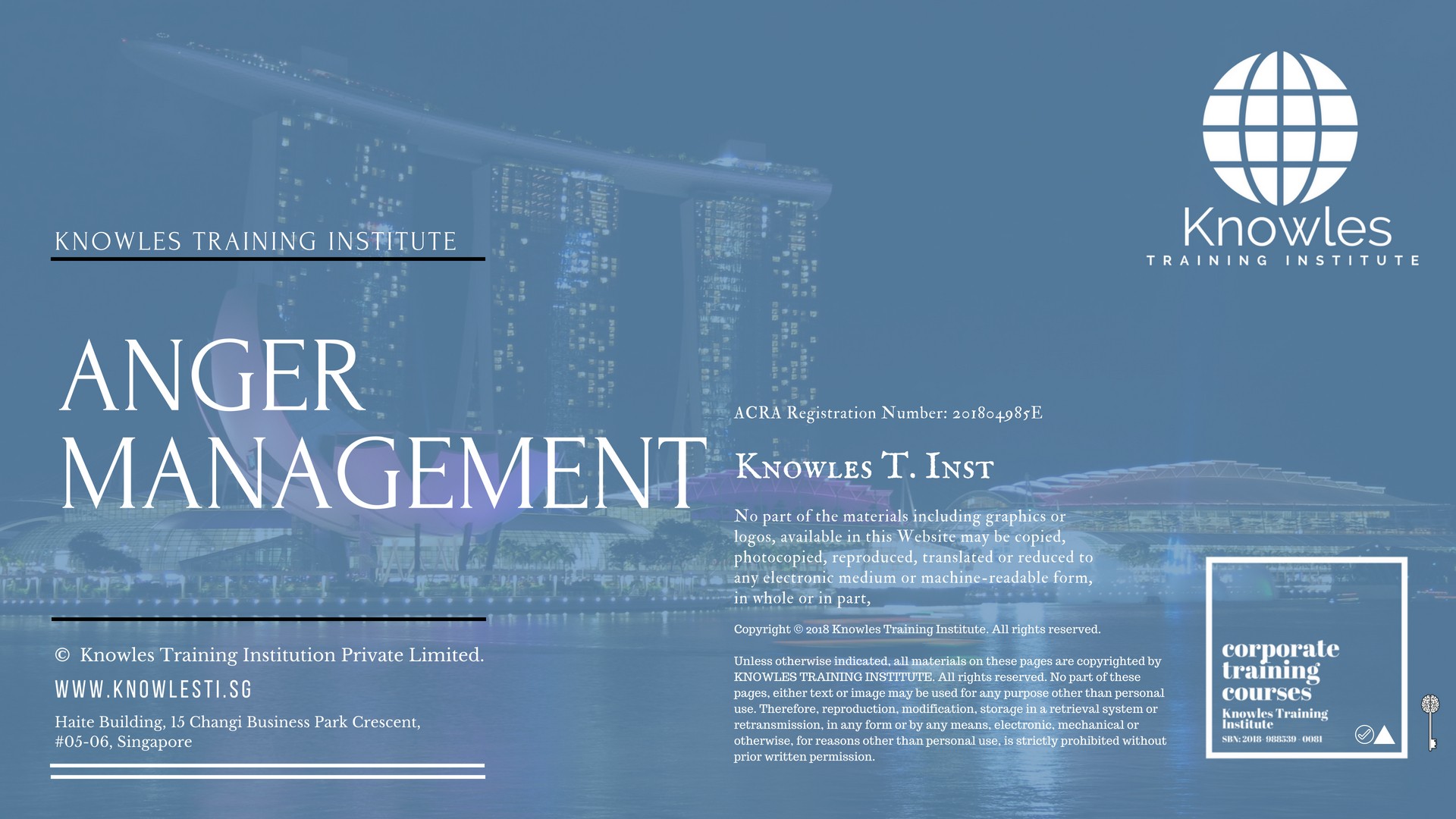
About This Anger Management Training Course in New Zealand
Anger Management Training Course in New Zealand
Anger Management New Zealand: In this one-day anger management class, training participants will learn the process of learning to recognise signs of anger. Parcitipants will also learn the necessary action to calm themselves down whe they are on the verge of anger, as well as to deal with situation that stimulated anger in a much more productive way. It is important to note that anger management does not prevent you from feeling anger or encourage you to keep the anger inside of you. This is a misconception about anger management training. Anger is a normal and healthy emotion the key is to know how to express it appropriately. In this course participants will learn how to do this effectively.
Here are some important questions to ask yourself before you plan to attend this anger management course:
- Do you tend to lose your cool often?
- Do you often find yourself having heated arguments with the people closest to you?
- Do you fly off the handle easily?
- When someone hurts you bad, you usually want to get even with them?
- Do you find yourself constantly grumpy?
- Are you irritated by a lot of things at home or at work?
- Is your anger issues affecting your relationships with co-workers and/or family members?
- Do you suffer from road rage?
- Do you find it hard to forgive someone who has done you wrong?
- Do you get angry when you think of the bad things that people did to you in the past?
- Does waiting in line or waiting for other people, annoy you?
If you responded ‘yes’ to most of the questions, you might want to talk to attend our anger management course to learn and understand where your anger originates from. It is also essential for you to learn healthier methods to cope with your anger before it goes out of control. It is crucial to handle your anger more efficiently as it will improve your happiness level and your overall well-being. Knowing how to manage your anger will also benefit the people around you, particularly your loved ones.
Who Should Attend This Anger Management Course in New Zealand Workshop
This Anger Management Training Course in New Zealand workshop is ideal for anyone who would like to gain a strong grasp and improve their ability to handle their anger is a well-controlled manner.
Anyone with anger issues
Group Size For This Anger Management Training Program in New Zealand
The ideal group size for this Anger Management course in New Zealand is:
Minimum: 5 Participants
Maximum: 15 Participants
Course Duration For This Anger Management Skills Course in New Zealand
The duration of this Anger Management Training Course in New Zealand workshop is 1 full day. Knowles Training Institute New Zealand will also be able to contextualised this workshop according to different durations; 2 full days, half day, 90 minutes and 60 minutes.
1 Full Day
9 a.m to 5 p.m
Anger Management Course in New Zealand Benefits
Below is the list of course benefits of our Anger Management course in New Zealand
What are some benefits of attending an anger management training course in New Zealand?
- Learn to become more empathetic.
- The science behind anger.
- Build better personal and professional relationships.
- Gain new insights into what causes anger.
- Find out your trigger points.
- Develop better judgement.
- Reduction in stress.
- Replace your aggressive communication style with an assertive communication style.
- Better to address anger issue immediately before it snowballs and turns into an outburst.
- Reduce your Quarrelsome nature.
- Utilise your anger to your benefit by helping it motivate you in a more productive way.
- Learn how to vent out your anger the appropriate way.
Anger Management Course in New Zealand Objectives
Below is the Course Objectives For The Anger Management Training Workshop:
Anger Management Course in New Zealand – Part 1 : Understand Anger
- The Science Behind Your Anger
- The Cycle of Anger
- Understand The Fight or Flight
- The 5 Most Common Myths About Anger
Anger Management Course in New Zealand – Part 2 : The Sources of Anger
- The 9 Sources of Anger You Must Know
Anger Management Course in New Zealand – Part 3 : The Dos and Don’t of Anger Management
- Common But Unhelpful Ways of Dealing with Your Anger
- The New Way: Helpful Ways of Dealing with Your Anger
Anger Management Course in New Zealand – Part 4 : The Hidden Dangers of Suppressing Your Anger
- Leads to Depression
- Leads to Broken Relationships
- Leads to Chronic Illnesses
- Leads to Violence
- Leads to Anxiety
Anger Management Course in New Zealand – Part 5 : Gaining Ultimate Control of Your Anger
- Using The Coping Thoughts Technique
- Relaxation Techniques Backed by Science
- Blowing off Some Steam The Right Way
Anger Management Course in New Zealand – Part 6 : Learn To Separate the People from the Problem
- Learn the Difference Between Objective vs. Subjective Language
- How to effectively Identifying the Problem
- Using “I” Messages Technique
Anger Management Course in New Zealand – Part 7 : Working on the Anger Problem
- Learn to Use Constructive Disagreement With Ease
- Natural Negotiation Techniques
- How to Build Consensus The Right Way
- Identifying Quick and Useful Solutions
Anger Management Course in New Zealand – Part 8 : Solving the Anger Problem
- Choosing The Solution
- Making an Effective Plan
- Getting it Done Right The First Time
Anger Management Course in New Zealand – Part 9 : A Personal Anger Management Plan
- What are Hot Buttons
- Identifying Your Personal Hot Buttons
- A Personal Anger Log That is Easy to Use
Anger Management Course in New Zealand – Part 10 : The Triple-A Anger Approach
- Alter The Situation
- Avoid The Situation
- Accept The Situation
Anger Management Course in New Zealand – Part 11 : Dealing with Angry People With Diplomacy & Tach
- Understanding the Energy Curve
- Top 3 De-Escalation Techniques You Can Use Immediately
- Learn When to Back Away and What To Do Next
Course Content For This Anger Management Training Course in New Zealand
Below is the list of our course content for Anger Management training course in New Zealand
Anger Management Course in New Zealand – Part 1
- The science behind anger: Understand what is anger & why you get angry.
- The cost of getting angry and why it should worry you.
- Why are people so angry all the time.
- How anger affect our physical bodies.
Anger Management Course in New Zealand – Part 2
- Anger management training in the workplace.
- How anger affects our mind.
- How and why your mind can deceive you when you are angry.
- How to comprehend problems from multiple perspectives.
Anger Management Course in New Zealand – Part 3
- Why it is impossible to think clearly when you are angry.
- The different types of anger.
- Understand your dominate anger type.
- Learn to control your anger before you blow up.
Anger Management Course in New Zealand – Part 4
- Find and understand the source of your anger.
- Effective breathing exercises to cool off.
- Increase your emotional awareness.
- Maintaining a cool, calm composure.
Anger Management Course in New Zealand – Part 5
- Deep relaxation at will.
- Tricks the mind plays.
- Dissolve negative emotions.
- Relax under pressure.
Anger Management Course in New Zealand – Part 6
- Cool blue breathing technique to reduce anger.
- Understanding your own emotion and stress level.
- Analyse Your job and learn to spot the warning signals.
Anger Management Course in New Zealand Value Added Materials
Each participant will receive the following materials for the Anger Management course in New Zealand
Anger Management Course in New Zealand Learner’s Guide
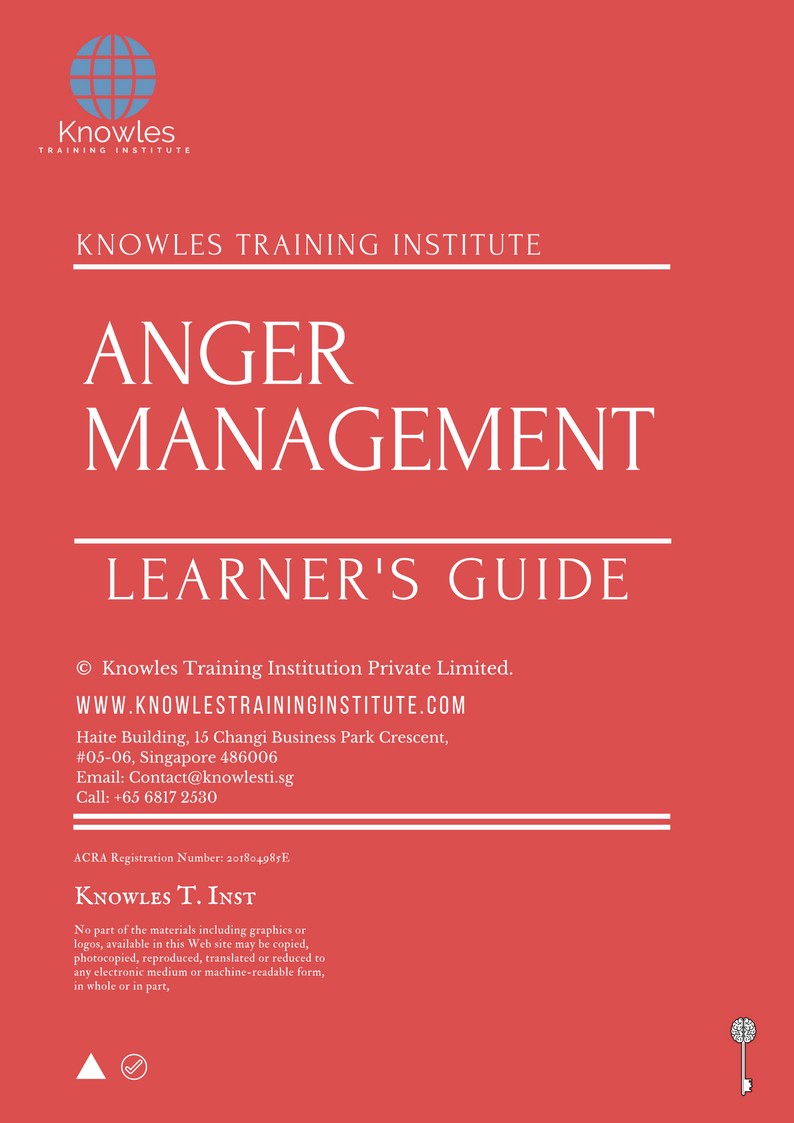
Anger Management Course in New Zealand Handouts
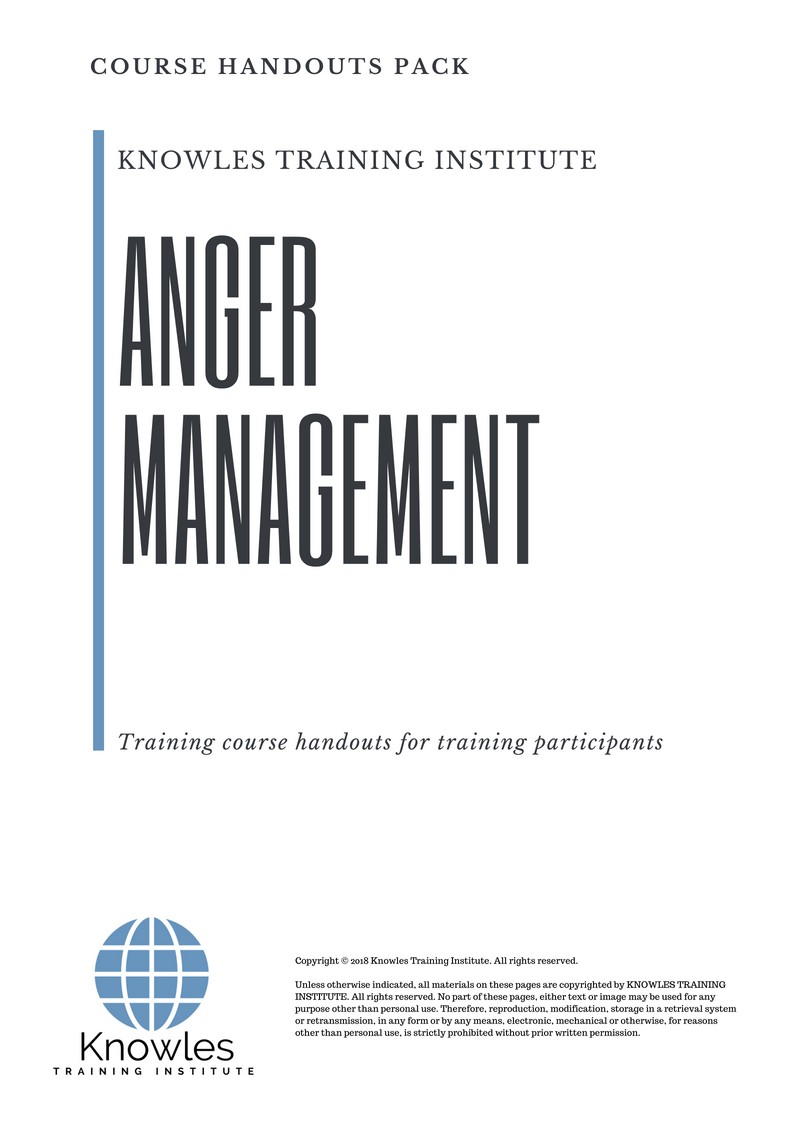
Anger Management Course in New Zealand PPT Slides Used During Course
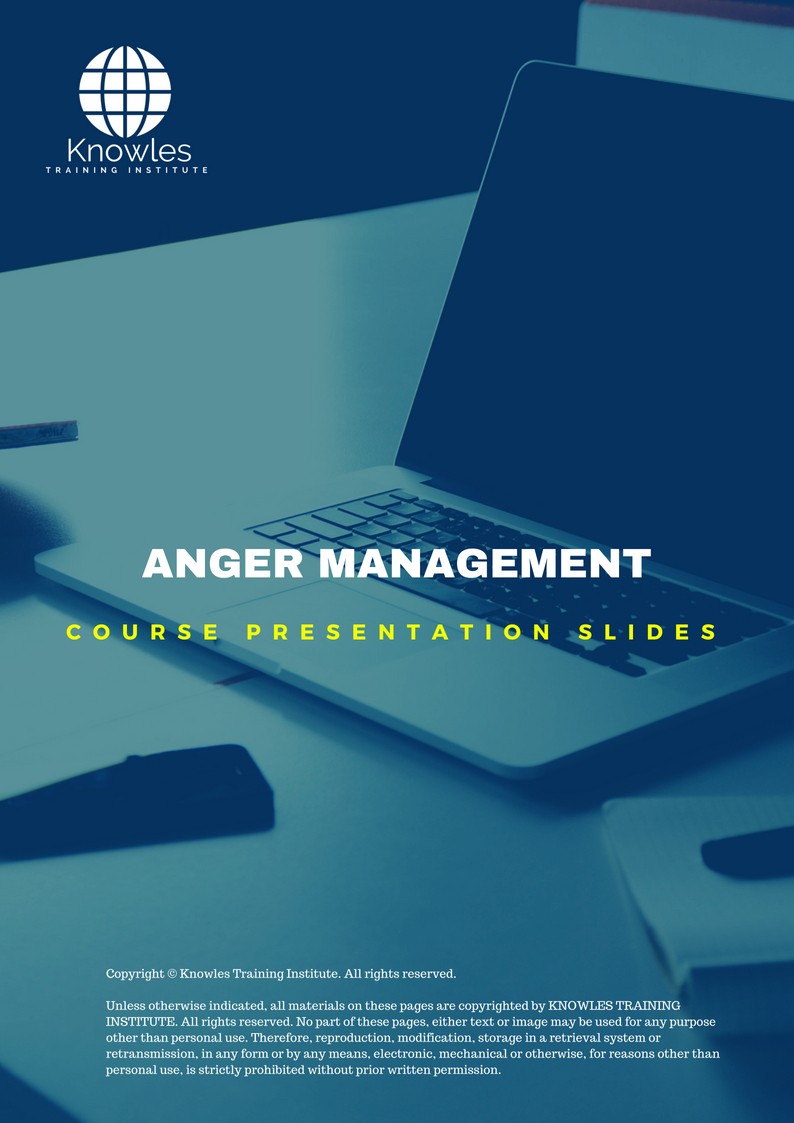
Anger Management Course in New Zealand Certification
Each course participant will receive a certification of training completion
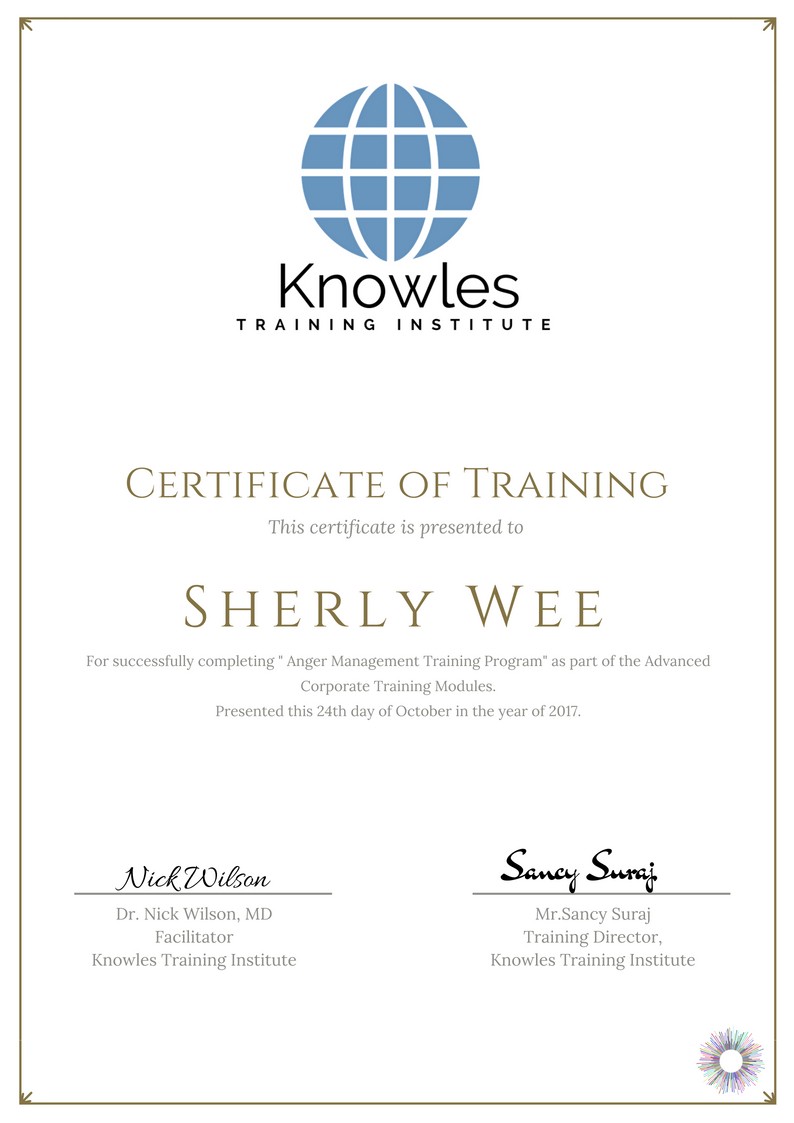
Course Fees For Anger Management Training Course in New Zealand
There are 4 pricing options available for this Anger Management Training Course in New Zealand. Course participants not in New Zealand may choose to sign up for our online Active Listening Skills training course in New Zealand.
- USD 679.97 For a 60-minute Lunch Talk Session.
- USD 289.97 For a Half Day Course Per Participant.
- USD 439.97 For a 1 Day Course Per Participant.
- USD 589.97 For a 2 Day Course Per Participant.
Discounts available for more than 2 participants.
Upcoming Anger Management Training Course in New Zealand Schedule
Contact us for the latest Anger Management Training course in New Zealand schedules
Email: contact@knowlesti.nz
Message:
Anger Management Training Course In New Zealand Brochure
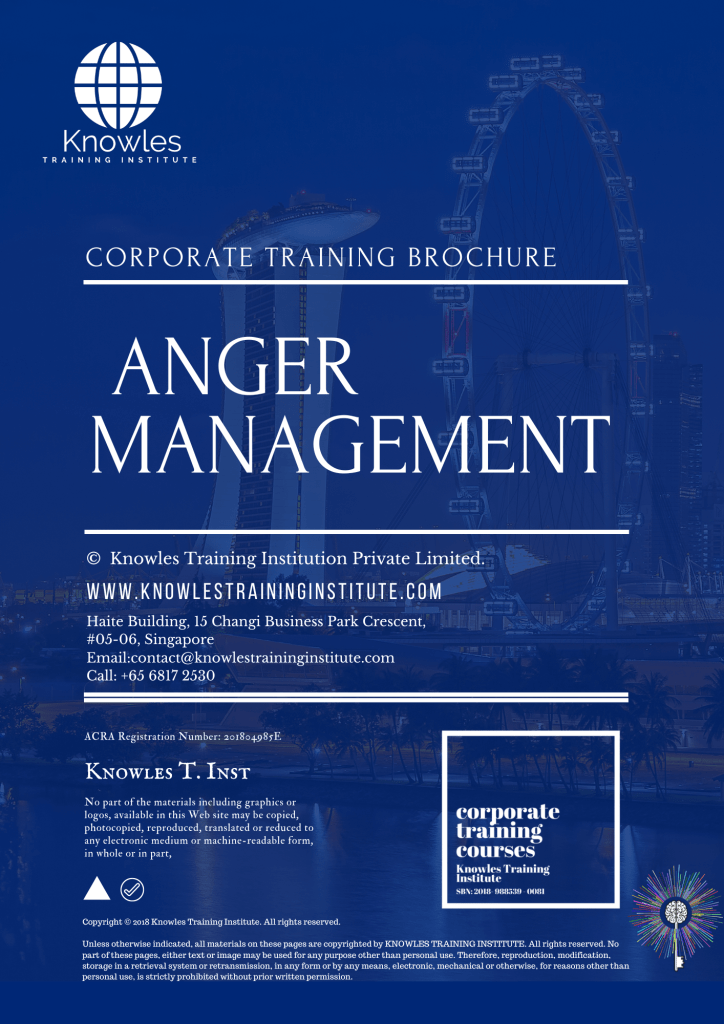
Request for this Anger Management Training course In New Zealand brochure. Fill up the short information below and we will send it to you right away!
Post Training Support: A vast majority of training does not have any effect beyond 120 days. To work, training has to have a strong pre- and post-training component. Post-training reinforcement helps individuals to recall the understanding and ask questions.
Blended Learning: Learning does not occur in the classroom. Virtually everybody prefers distinct ways of learning. Successful learning should have a multi-channel, multi-modal strategy.
- We Understand The Industry: We’ve got a profound comprehension of the business, business design, challenges, strategy and the that our participants are in and have designed the courseware to cater to their professional needs.
- Course Content: Knowles Training Institute’s material is relevant, of high quality and provide specific learning results. Participants will leave the training course feeling as they have gained a strong understanding and will also be in a position to execute what they have learned sensibly.
Course Development — The workshop modules follow a systematic and logical arrangement. This structure helps to ensure that the course material allows the facilitators to deliver the course in a logical arrangement. Consider the subjects as building bricks into learning, our facilitators slowly build towards a comprehensive picture of this entire topic.


Course Enquiries

Fill up the form and we will get back to you in less than 1 working day.
Alternatively, give us a call to have one of our training consultants contact you. Our corporate training courses can be contextualized to meet your organization’s training needs. Leverage on our large pool of professional trainers and consultants for your organization’s training needs.
Email: contact@knowlesti.nz
We Guarantee 100% Privacy. We Respect Your Privacy. Your Information Will Never Be Shared.


